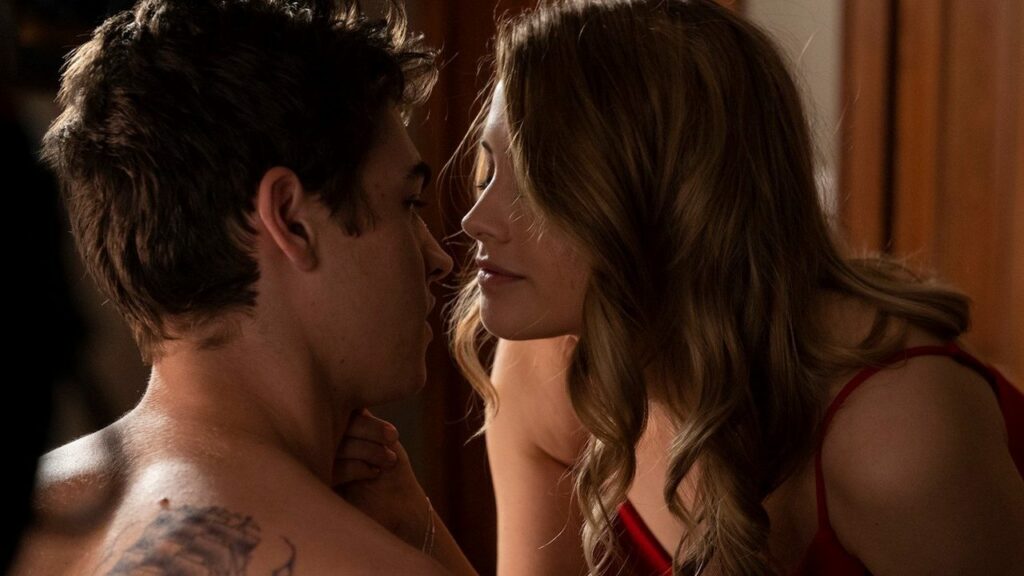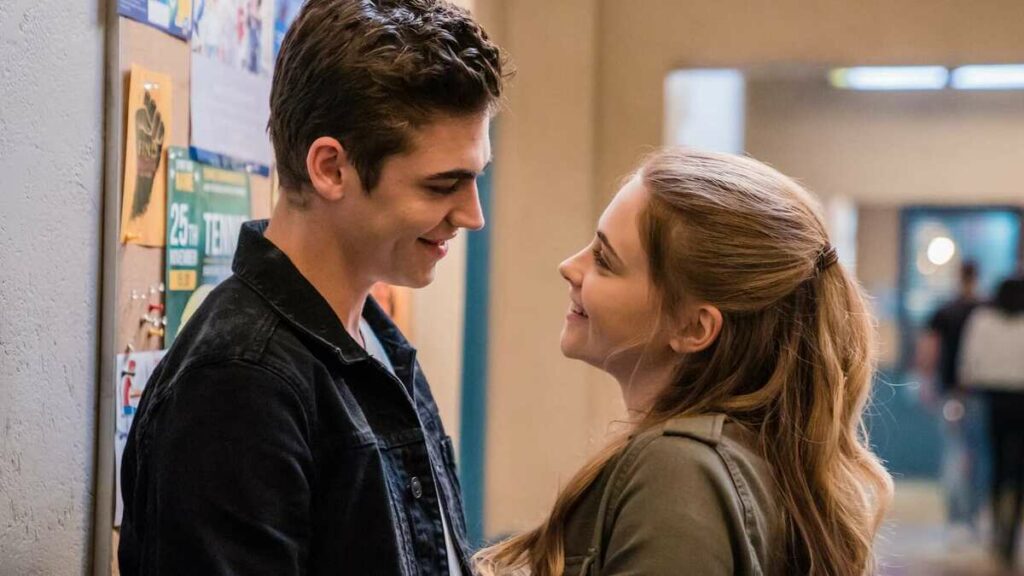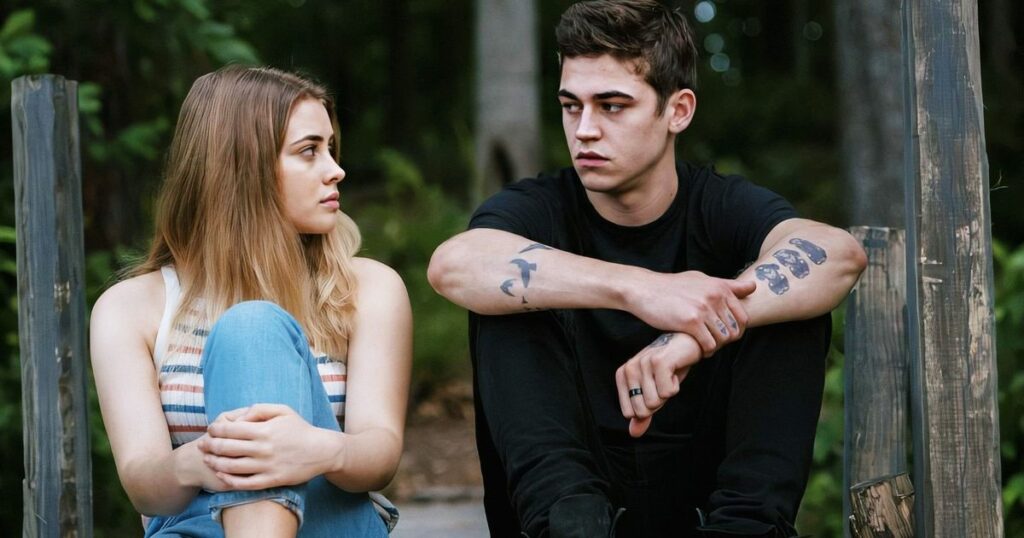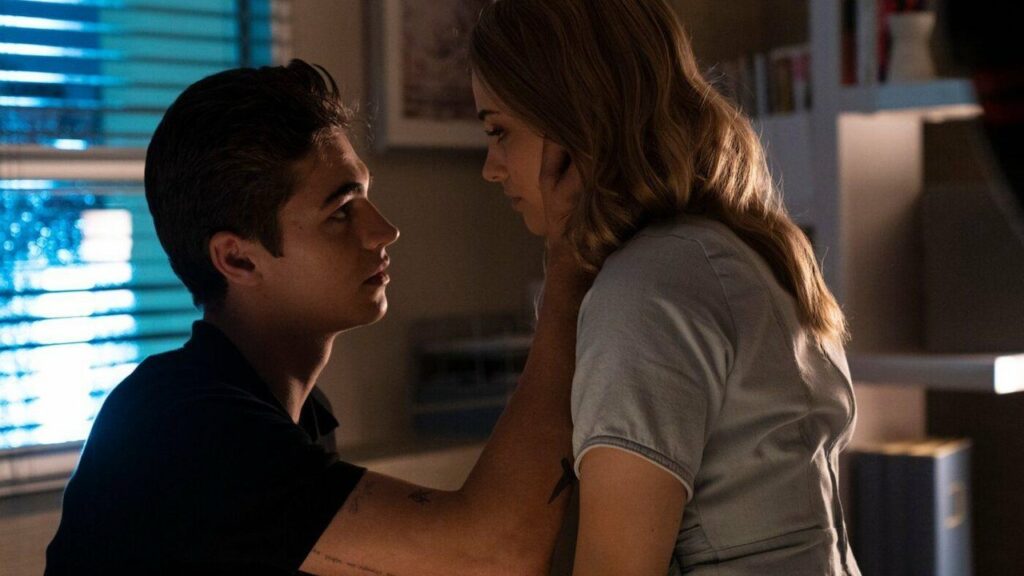After We Fell explores the broken, deeply imperfect and yet strangely endearing relationship between Hardin (Hero Fiennes Tiffin) and Tessa (Josephine Langford) in even greater detail than before. Steamy, tumultuous, and at times toxic, Tessa and Hardin are far from the perfect couple, yet their sheer determination (bordering on desperation) to stay together will melt even the hardest heart – enough to forgive at least some of their transgressions.
There is a deep and loyal fanbase for Anna Todd’s After series, probably due to the fact that Tessa and Hardin’s flaws make them more human, more relatable to their audience. Most significantly, they leave space for the two to grow and develop through each film, slowly becoming the best and most likeable versions of themselves, even if they aren’t quite there yet; it’s a growth that is a joy to witness.
Unlike the childish struggles of the past, After We Fell throws far more difficult hurdles at our couple, from job offers and long-distance relationship woes, to long-kept family secrets and estranged parents stepping back onto the scene. It all feels more terrifying and high-pressure than ever, ensuring a mildly entertaining (though admittedly not gripping) watch for casual viewers, and an absolute delight for the hard-core fans.

As with any film, the music in After We Fell adds an essential depth and emotional intensity to the production. Outtake spoke to composer George Kallis about working on After We Fell and how fans played a surprisingly large role in his compositions.
What was it like to join such a big franchise, something so established and well known?
George Kallis: It was actually a very organic process learning about the franchise because at the very beginning when Castille Landon called me she never really mentioned a franchise. She said she’d be working on this new film and it’s about this couple – she explained the intoxicating relationship they have – and she said that she’d love to have me on board and asked me to send her some music so she could pitch me to the producers.
So, basically, right after that phone call I realised that I didn’t have the type of music that Castille was looking for so I figured I’d spend the rest of the day composing some themes, some thematic material, based on the description that she gave me. I wrote two tunes, around one minute each, and I send it to Castille. A few months go by and I get the call that I’m being hired to compose the music for the next After film.
In a way, I think it was great because I wasn’t really affected by what the previous movies did, and Castille’s idea, maybe she did this subliminally, but she wanted to recharge the franchise with this film. She wanted a little bit more of a developed relationship within the couple, and I think that is what the score is doing.
So, yeah, my involvement in finding out about the franchise was organic, in a sense.

That might be the best way to do it. Perhaps it gave you that freedom before you knew the intensity of it.
George Kallis: Indeed. Castille was so great at describing what she wanted, you know, we wanted a theme that was emotive and which gives attention to the love they have and the passion they have. At the same time, we wanted it to go a little bit minor because there’s a sadness to the push and pull that they’re having all the time. I think Castille was brilliant at telling me what she wanted without actually telling me what the film was.
How did it feel then, when you found out the project you were working on was After We Fell? Was there a sense of pressure or excitement?
George Kallis: It was definitely very exciting! The first thing I did was go and watch the other two films because I wanted to see whether I was too far away from the soundscape that was established by the previous composer, Justin Burnett, who did a brilliant job in capturing the sprouting initial love that’s between them.
My only concern was being very true to the fans because the fans are so passionate about the books and the films. They have their opinions, there are so many different opinions, about the editing and about what scenes we should be choosing to put in the film from the books, so I, along with the filmmakers and producers as well- we were all very aware of this- wanted to give the fans the best possible viewing experience.
That was my only concern: being able to be true to the fans and give them exactly the emotiveness and soundscape that the movie required.
It’s one of those things, I suppose, where when you have a really popular franchise, it’s amazing to enter that energy and be part of that movement, but there is also a sense of responsibility.
George Kallis: Indeed. I experienced this before in my second ever film – the fifth film of the Highlander franchise. It was a big franchise in the nineties and I was at the very beginning of my career, so in a way that gave me some experience going into a big franchise with a very passionate fanbase. I remember the fans back then were so passionate, one even hacked into my FDP and actually stole a few music queues from my demos, so I was particularly careful on After We Fell just to make sure nothing went astray.
For After We Fell, the fans were actually very supportive. Even when I announced that I was scoring the film, they went and listened to my previous music and I received very nice emails. They even made suggestions about what I should be doing! So in a way, I might even say there was a bit of collaborating because we were getting a lot of feedback about what the fans were looking for, so I was keeping that in mind when I was scoring.
Amazing! And do you think, ultimately, that this communication and connection with the fans, their passion, that it was largely a good thing? Or was it at all distracting?
George Kallis: No. Not at all! Maybe there was a greater sense of pressure, because you felt that the audience was closer to this than any other film that I had done, but I think that it was rewarding, very rewarding, because I felt that the fans were very close to it and were trying to give me the best possible interpretation of what they expected the music to be doing. It was wonderful.

Speaking of Castille, what was it like to work with her? It sounds like you have a really good working relationship.
George Kallis: Oh, she’s brilliant! Castille has this perfect way of suggesting what she wants but then letting you take the lead and, at least from the music perspective, making it your own. She doesn’t micro-manage, she kind of macro-manages if that makes sense? We talk about feelings, we talk about what we want out of each scene, the type of melody or the type of instrumentation, and then she leaves it up to me to interpret her words. It’s fantastic because as an artist I feel that I can actually create what I think is best for After We Fell and the characters’ story.
There are other directors that like to be very much involved-and that is totally fine too, I can work with both- but in these types of collaborations, you feel a little more freedom to explore and go in different directions than what might be obvious. Consequently, you might be able to bring something completely new to the table and have some really nice surprises, so yeah, I always really enjoy working with Castille.
You can only offer someone that creative freedom if you trust them. Was Castille always like that or have you noticed that you are able to get that more as your relationship develops?
George Kallis: I think the development was mostly in regards to trust, as you said. I think she is the type of director who trusts all her collaborators, I think it’s the same with anything, it’s the same with the colouring, having seen a little bit of footage from the shooting it seems like that’s how she works with actors too. She gives them a general guide of what the scene is and then she lets them roll.
I think once you trust your casting and the talent, then you let them bring the best they can for the film. I find, at least with my own collaborators, when I am collaborating on a song for example, and I send a certain melody to an arranger I won’t tell them exactly what I was imagining, I let them just do their own thing because that can bring in a lot of surprises.
Castille, the mentality that she had, I think it was like that from the beginning, and the trust is more on the polishing now. She might ask a question, let’s say I score a C, she might say that she likes it but suggest trying a different approach. It might be just a question of me thinking about something completely different and usually by the second revision we’ve nailed it. So it’s a very smooth and organic process.

You’ve touched on the new direction and maturity that you and Castille aimed for in After We Fell. How did you portray this new maturity and emotional complexity through your music?
George Kallis: In the first two films we saw the irresistible young love that was sprouting, while in After We Fell we are in more grown-up situations. The couple is really being pushed to the edge, we find out about Tessa’s health issues, the appearance of Robert who comes in between them, her estranged father comes back, so it was a real discussion to try and make the music sound more developed too. I composed a new theme, where the melodies are being altered between a minor and major key and this addressed a happy or sad situation accordingly, without losing connection to the couple.
We mostly stayed in a major key but it’s a little bit ambiguous, it’s not really a happy key. We go into minor chords, plus we make sure (and this was Castille’s direction, I have to give it to her), that we use the piano, which we kept to connect to the soundscape of the two previous films where Justin uses a lot of piano, but we used it in more of a middle musical register. Additionally, we didn’t go up too many times, so that also gives a warmth and a more earthy tone to the themes and, in a sense, makes it sound a little more mature. Those were the two things I kept in mind when I was scoring After We Fell.
In addition to all this, with the aim of keeping the audience connected and immersed throughout, I think I subliminally gave more weight to the orchestra. We used a live orchestra, a live string orchestra, and in certain scenes, for example, a scene where Hardin breaks down (which he rarely does), there’s a very dramatic moment towards the end where I let the string orchestra take the ropes. In particular, a solo cello drives the scene forwards, and I think that gives a lot of maturity and weight to the scene. We used all these tools to make sure we have a more cinematic and a more grown-up soundscape for our film.
What was it like scoring films during the pandemic?
George Kallis: I was actually the busiest I’ve ever been during the pandemic, which is just crazy to think about! That might actually be why I didn’t get so affected by the pandemic, because I’m always stuck in the studio. Other people who love the outdoors and spend a lot of time outdoors were more affected, but I’m just a hermit who spends twelve hours in the studio every day.
It’s very fulfilling after you finish a score. Right now it’s the crunch time for the orchestral recordings for The Last Warrior 3 that I’m doing with Disney.

So you’re looking forward to being able to close that one as well?
George Kallis: Yeah, I’m having a great time, to be honest. I really love what I do, I love writing music and I think you get used to the pressure but at some point, you need that release too, once you’ve delivered. A time to refill the batteries before you start again.
It sounds like you’ve had a great time working on both After films. If you have any at all, what was your favourite part of it? Were there any moments that really stood out to you?
George Kallis: Every scene had a different enjoyment in it because the film is so rich in its scenes and for a lot of it I had to change the music around quite a lot. For example, I mentioned that scene with Hardin breaking down to you before. I was actually very happy to make that decision of getting that solo cello to drive the scene forward because it seems to be one of the fans’ favourite scenes. I think the music made an impact for that scene.
The most challenging scene was the phone sex scene because all the other lovemaking scenes are covered by songs, but Castille wanted an instrumental for that one. So I had to forget about the orchestra, forget about the piano and dig into electronics and go with more synths and plug-ins to create a low-fi instrumental that sounds like a pop song.
For me, it was a very rich experience composing the score to After We Fell because I had to dig into different genres. For instance, there’s a moment where Hardin is having a nightmare of Robert being with Tessa and there’s a lot of techno influences in that cue. I had a blast in scoring this because it was just wonderful to experiment with all genres of music.
You’ve been very busy the last year or two. Is there anything else in your jam-packed schedule for us to look forward to?
George Kallis: I’m looking forward to finishing the Disney project next month and I’ve got a series that might be coming up, but it’s still not finalised yet. There’s also another film that I will be doing with a friend of mine, but I don’t want to give too many details out. For now, I look forward to a few weeks off, until Christmas at least, and in the New Year hopefully the series will be set (we’ll do the pilot first) and then I’ll start working on my friends’ film.
After We Fell is available to stream on Amazon Prime now.
